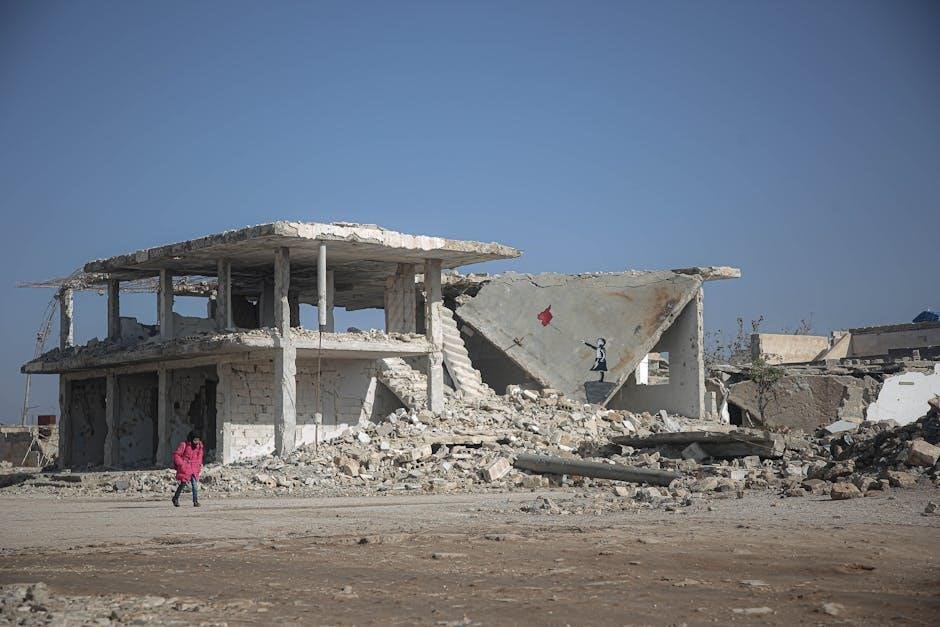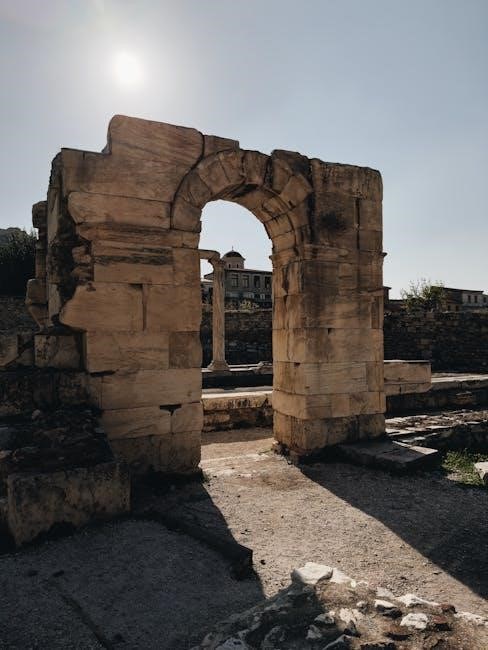Remains by Simon Armitage is a haunting exploration of war’s psychological toll, delving into guilt, trauma, and moral ambiguity through vivid imagery and a first-person narrative.
Overview of the Poem
Remains by Simon Armitage is a poignant war poem exploring a soldier’s haunting memories of a fatal shooting during a bank looting incident. Published in The Not Dead (2008), it captures the psychological aftermath of violence, guilt, and moral dilemmas. Through vivid imagery and colloquial language, Armitage conveys the soldier’s trauma, replaying the event and grappling with its consequences. The poem delves into the lasting emotional scars of war, offering a raw, relatable portrayal of conflict’s human cost.
Significance of “Remains” in Simon Armitage’s Work
Remains stands as a pivotal piece in Simon Armitage’s oeuvre, showcasing his ability to blend accessible language with profound emotional depth. The poem is significant for its unflinching portrayal of war’s psychological impact, a theme central to his work. Through its exploration of guilt and trauma, Remains highlights Armitage’s commitment to giving voice to the complexities of human experience, solidifying his reputation as a leading contemporary poet.

Background and Context
Remains was published in Simon Armitage’s 2008 collection, The Not Dead, drawing inspiration from soldiers’ stories and exploring the psychological aftermath of war through colloquial, relatable language.
Publication and Collection
Remains by Simon Armitage was first published in 2008 as part of his collection, The Not Dead, which focuses on the psychological aftermath of war. The poem draws inspiration from Armitage’s interviews with soldiers, offering a raw portrayal of guilt and trauma. Its inclusion in educational resources, such as BBC Bitesize, underscores its relevance for studying conflict poetry and its impact on soldiers’ mental health.
The Not Dead: A Collection of War Poetry
The Not Dead is a poignant anthology by Simon Armitage, capturing the voices of soldiers grappling with the aftermath of war. Through raw, unflinching narratives, the collection explores themes of trauma, guilt, and survival. Remains stands out as a centerpiece, offering a searing account of a soldier’s haunted memories, which resonates deeply with readers and scholars alike, making it a vital work in modern war poetry.
Simon Armitage’s Inspiration and Research
Simon Armitage drew inspiration for Remains from interviews with soldiers, capturing their harrowing experiences. His meticulous research into the psychological impact of war informed the poem’s vivid imagery and emotional depth, ensuring authenticity and resonance in portraying the soldier’s haunting memories and moral dilemmas.

Poetic Style and Structure
Remains was published in Simon Armitage’s collection The Not Dead in 2008, a series of poems reflecting on the psychological aftermath of war and its impact on soldiers and its lasting effects.
Accessible Language and Relatable Themes
Simon Armitage’s Remains employs straightforward, colloquial language to explore profound themes of guilt, trauma, and moral ambiguity. The poem’s relatable tone ensures its universal appeal, allowing readers to connect deeply with the soldier’s psychological struggle. By avoiding overly poetic jargon, Armitage creates an intimate, authentic narrative that resonates beyond the war context, making the complexities of human emotion accessible to all. This approach underscores the poem’s enduring relevance and emotional impact.
Use of Colloquial Language
Simon Armitage’s Remains features colloquial language to create a raw, conversational tone, mirroring the soldier’s inner dialogue. Phrases like “legs it up the road” and “letting fly” reflect everyday speech, grounding the narrative in reality. This linguistic choice fosters immediacy and authenticity, drawing readers into the soldier’s harrowing experience. The casual tone contrasts sharply with the gravity of the events, heightening the emotional impact and making the soldier’s guilt and trauma feel deeply personal and relatable to readers. This approach ensures the poem’s accessibility and resonance, bridging the gap between the battlefield and the reader’s world.
Structure and Narrative Flow
Remains employs a straightforward, chronological structure to recount the soldier’s experience, enhancing the narrative’s immediacy. The use of short, direct sentences mimics the soldier’s fragmented memories, creating a sense of urgency. Armitage’s careful pacing builds tension, while the repetitive recollection of the shooting underscores the soldier’s psychological burden. This structure effectively conveys the disorienting nature of trauma, immersing the reader in the soldier’s haunting recollections and emotional turmoil, making the poem’s impact both profound and unforgettable. The narrative flow mirrors the soldier’s mental state, oscillating between clarity and chaos, reflecting the lingering effects of war on the human psyche.
Themes and Motifs
Remains explores themes of guilt, trauma, and the psychological impact of war, symbolized by recurring imagery of blood and shadows, representing the lingering effects of violence.
The Psychological Impact of War
Remains vividly portrays the mental scars of war, as the soldier grapples with haunting memories of the looter’s death. The uncertainty of the looter’s guilt intensifies the narrator’s trauma, creating a cycle of remorse and self-doubt. Armitage’s depiction of the soldier’s internal struggle highlights the enduring psychological toll of combat, where the mind repeatedly replays the violence, unable to escape the weight of actions taken in the chaos of war.
Guilt and Trauma in Combat
Remains captures the deep-seated guilt and trauma experienced by a soldier after killing a looter. The narrator’s recollection of the event is fraught with uncertainty, questioning whether the looter was armed. This ambiguity fuels his remorse, emphasizing the moral complexity of combat decisions. Armitage’s portrayal illustrates how soldiers often bear the burden of their actions long after the conflict ends, with memories haunting them relentlessly.
The Futility of War and Moral Dilemmas
Remains underscores the futility of war through the senseless violence of a bank looting incident. The soldier’s act of shooting a looter, possibly unarmed, highlights the moral dilemmas inherent in combat. Armitage’s vivid depiction questions the true cost of such actions, revealing how they lead to lasting psychological scars rather than resolution. This narrative challenges the notion of war’s purpose, emphasizing its devastating impact on individuals and humanity.

Narrative and Perspective
Remains employs a first-person narrative, offering a direct and intimate account of the soldier’s experiences. This perspective immerses readers in the soldier’s psyche, emphasizing guilt and trauma.
First-Person Narrative
The poem is told through a first-person narrative, offering a personal and intimate account of a soldier’s experiences during a bank looting incident in a war zone. This perspective immerses readers in the soldier’s psyche, highlighting their guilt, trauma, and haunting memories. The use of “I” creates immediacy, making the violent event and its aftermath feel deeply personal. This narrative choice emphasizes the soldier’s internal struggle and moral ambiguity, drawing readers into their emotional turmoil.
The Soldier’s Guilt and Haunting Memories
The soldier is consumed by guilt over shooting a looter, replaying the event repeatedly in his mind. Memories of the man’s death and the uncertainty of whether he was armed haunt him. Armitage vividly portrays the psychological burden, emphasizing the moral dilemmas and lasting trauma faced by soldiers. The imagery of blood and shadows underscores the soldier’s inability to escape his past, leaving him trapped in a cycle of remorse and self-doubt.

The Looter’s Death and Its Aftermath
The looter’s violent death, described in graphic detail, leaves a lasting impact on the soldier. The aftermath reveals the moral complexity of war, as the soldier grapples with the consequences of his actions. Armitage’s vivid portrayal of the looter’s suffering and the soldier’s guilt highlights the devastating effects of violence. This event becomes a defining moment, shaping the soldier’s psyche and underscoring the futility of conflict.
Imagery and Symbolism
Remains employs vivid imagery of violence and death, symbolizing the lasting psychological scars of war. Blood and shadows represent guilt, trauma, and the moral darkness of conflict.
Vivid Imagery of Violence
Remains by Simon Armitage employs vivid imagery to depict the violent act of shooting a looter, creating a disturbing scene that haunts the soldier. The poem describes the man running, the sound of gunfire, and the brutal death in graphic detail. Armitage’s use of blood and shadows symbolizes the lasting trauma and guilt embedded in the soldier’s mind, emphasizing the psychological toll of such violent acts. The imagery conveys the moral complexity and emotional weight of war.
The Symbolism of Blood and Shadows
In Remains, blood symbolizes guilt, violence, and irreversible moral consequences, while shadows represent haunting memories and ambiguity. The bloodstain on the soldier’s mind embodies lasting trauma, while shadows signify the lingering presence of death and uncertainty. These symbols reinforce the poem’s exploration of psychological turmoil and moral complexity, creating a vivid and enduring visual of the soldier’s inner conflict and the futility of war.

The Relevance of the Bank Looting Scene
The bank looting scene in Remains serves as a catalyst for exploring moral ambiguity and psychological trauma. It highlights the chaos of war, where decisions made in seconds lead to lasting guilt. The scene’s focus on an unarmed civilian’s death underscores the futility of violence and the blurred lines between right and wrong, central to the poem’s critique of conflict and its aftermath.
Literary Devices
Remains employs irony, dark humor, and repetition to convey the soldier’s guilt. Armitage’s use of vivid imagery and allusions, like the reference to Macbeth, enhances the poem’s emotional depth.
Irony and Dark Humor
Armitage employs dark humor and irony to underscore the moral complexity of war. The line, “three of a kind all letting fly,” contrasts the casual tone with the grim reality of violence. The poem’s use of irony highlights the absurdity of war, while the dark humor serves as a coping mechanism for the soldier’s trauma, creating a stark yet thought-provoking narrative.
Repetition and Its Effect
Armitage uses repetition effectively to emphasize the soldier’s haunting memories. The recurring imagery of the looter’s death and the blood-shadow creates a sense of inescapable trauma. This technique mirrors the soldier’s obsessive replaying of the event, reinforcing the psychological burden and the futility of war. The repetition underscores the lasting impact of violence, making the poem’s themes resonate deeply with readers.
Allusions to Other Works
Armitage subtly alludes to Shakespeare’s Macbeth through the haunting imagery of blood and guilt, evoking the ghost of Banquo. This reference enriches the poem’s exploration of trauma and moral reckoning, drawing parallels between the soldier’s psychological torment and Macbeth’s descent into madness. The allusion underscores the timeless themes of guilt and the inescapable consequences of violence, resonating deeply with readers familiar with Shakespearean tragedy.

Reception and Analysis
Remains has received critical acclaim for its raw portrayal of war’s psychological impact, with its accessible language making it a popular choice for educational study and analysis.
Critical Reception of the Poem
Remains has garnered widespread critical acclaim for its unflinching portrayal of war’s psychological aftermath. Critics praise its vivid imagery and raw emotional depth, particularly in conveying the soldier’s haunting guilt and trauma. The poem’s accessible language and relatable themes resonate with readers, making it a standout piece in Armitage’s collection The Not Dead. Its exploration of moral dilemmas and the futility of war has solidified its place in contemporary war poetry, often drawing comparisons to works by Wilfred Owen and other notable war poets.
Use in Educational Contexts
Remains is widely studied in educational settings, particularly in GCSE English Literature courses, for its exploration of war’s psychological impact. Teachers and students utilize the poem to analyze themes of guilt, trauma, and moral ambiguity. Its accessible language and vivid imagery make it an effective tool for teaching literary devices and encouraging critical thinking about conflict’s human cost. Resources like BBC Bitesize provide structured analysis, aiding deeper understanding of its complex themes and narrative structure.
Comparison with Other War Poems
Remains shares themes of trauma and moral ambiguity with works like Wilfred Owen’s Exposure and Jane Weir’s Poppies. While Owen’s poem focuses on the physical hardships of war, Armitage’s work delves into psychological scars, offering a modern perspective on conflict. This comparison highlights the evolution of war poetry, emphasizing the lasting emotional toll on soldiers, a theme prevalent in both classic and contemporary literature.
Simon Armitage’s Legacy
Simon Armitage, appointed Poet Laureate in 2019, has significantly influenced contemporary poetry with his accessible style and exploration of war’s complexities, as seen in Remains.
Armitage as Poet Laureate
Simon Armitage became Poet Laureate in 2019, following Carol Ann Duffy. Known for his accessible poetry, he explores relatable themes and everyday experiences, making his work widely appreciated. His appointment recognizes his significant contributions to British poetry, including his ability to connect with diverse audiences through his unique voice and style, as seen in works like Remains.
His Contribution to War Poetry
Simon Armitage’s poem Remains significantly contributes to war poetry by addressing the psychological toll of conflict through a soldier’s haunting memories. His work captures the moral complexities and emotional weight of war, offering a deeply human perspective. By translating soldiers’ experiences into accessible poetry, Armitage bridges the gap between the battlefield and civilian life, ensuring the voices of those affected by conflict are heard and understood.
Influence on Contemporary Poetry

Simon Armitage’s work, including Remains, has significantly influenced contemporary poetry by prioritizing accessibility and emotional depth. His ability to explore complex themes like war and trauma through relatable language has inspired many poets to adopt a more direct, human-centered approach. Armitage’s appointment as Poet Laureate further amplified his impact, making his style and thematic choices a benchmark for modern poetry, encouraging innovation while maintaining a connection to traditional forms and themes.

Availability and Resources
Remains by Simon Armitage is widely available as a free PDF download, along with study guides and analysis tools, making it accessible for educational and personal exploration.
PDF Versions and Online Access
PDF versions of Remains by Simon Armitage are readily available online, allowing readers to access the poem for free. Platforms like Google Drive and educational websites offer direct downloads, ensuring easy accessibility. Additionally, online archives provide the poem in both PDF and text formats, making it convenient for students and researchers to study and analyze the work digitally at any time.

Study Guides and Analysis Tools
Detailed study guides and analysis tools for Remains are available online, offering line-by-line interpretations and thematic insights. Educational resources, including BBC Bitesize and academic websites, provide comprehensive breakdowns of the poem’s structure, imagery, and historical context. These tools support deeper understanding, making them invaluable for students preparing for exams or conducting in-depth analyses of Simon Armitage’s work.
Recommended Readings and References
For further exploration of Remains, readers can access PDF versions online or through educational platforms like Google Drive. Additional references include critical essays, interviews with Simon Armitage, and comparisons with other war poems such as Wilfred Owen’s Exposure. These resources enhance understanding of the poem’s themes and place it within the broader context of contemporary war poetry;
Remains by Simon Armitage remains a timeless exploration of war’s psychological toll, offering a poignant reflection on guilt, trauma, and the enduring impact of conflict on humanity.
Final Thoughts on the Poem’s Impact
Remains leaves a profound impact, capturing the psychological scars of war through its vivid imagery and relatable themes. Armitage’s use of colloquial language and first-person narrative creates a direct connection with readers, making the soldier’s guilt and trauma palpable. The poem’s timeless relevance lies in its ability to evoke empathy and spark reflections on the moral dilemmas faced in conflict, ensuring its enduring resonance in modern literature.
The Timeless Relevance of “Remains”
Remains remains a poignant reflection on war’s enduring impact, resonating across time due to its universal themes of guilt, trauma, and moral ambiguity. Armitage’s accessible style ensures its relevance, while its exploration of psychological scars continues to evoke empathy and reflection. The poem’s ability to bridge personal and collective experiences ensures its lasting place in literature, offering insights into the human cost of conflict that transcend specific historical contexts.
